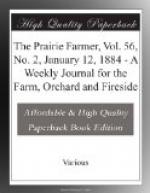One day Jack went to Denver for supplies. He went alone, and coming home later than usual, Ted and I and baby Mame went out to meet him. Jack looked sober and guilty, and seemed ill at ease. If he ever drank, I should have thought him intoxicated. In the wagon was a queer-shaped heap under a horse-blanket. I was sure it moved. When we got behind the barn Jack said, sheepishly, avoiding my eye.
“Well, Ted, I calkerlate I’ve got su’thing in that there waggin that ’ul astonish yer marm.”
Little Mame pulled the blanket off the heap; she had been peeping under it all the while she was in the back of the wagon. There lay a human being. Such an object; short and squat, dressed in a queer blue blouse with flowing sleeves, wide trousers and queer wooden shoes. He had small, black eyes, a shaven poll, from which depended a long thin queue. His countenance was battered and bruised, his clothes torn and bloody.
“There was a row down to Denver,” said Jack; “the Christian folks stove in these ‘ere heathen’s winders, tore their houses down, an’ killed half on ’em. I cleared out soon as I could. When I got half way home I heard a noise back o’ me, and out crawled this thing. I was so dumfounded I couldn’t speak. He thought I was going ter send him back, an’ he fell ter cryin’ an’ jabberin’ in that yap of his, an’ clingin’ onter my han’ an’ kissin’ of it. It sorter turned my stomach. I told him ter set down, give him some crackers ter eat, covered him up an’ told him he could live with me. What do you s’pose marm’ll say?”
“Oh! Cousin Jack,” I said, “of course, she will not care. Your home is a refuge for all the wretched and unfortunate.”
“Now don’t, Nell,” he said, turning as red as a rose, and busying himself about the harness. The Celestial looked at us solemnly: Mame toddled up to him. He looked at her curiously, but did not move.
“Get out, John,” said Jack, “you needn’t be scared no more; we’re to home.”
He got out stiffly, and, to my surprise, turned and lifted the baby down. She caught his pig-tail, and pulled it in wild delight. He seemed grieved when I took her away. When Jack told Mary, the good soul found a thousand reasons why he should stay, and hurried to make him a bed in the attic. The Celestial did not say much, but when Jack called him “John,” he smiled a sad smile.




